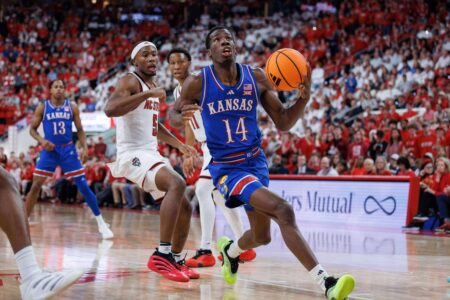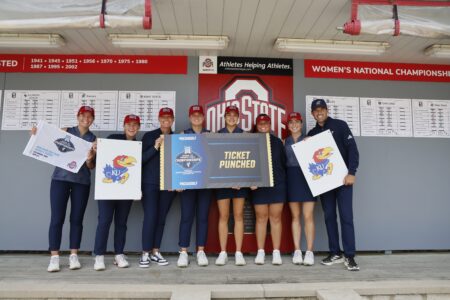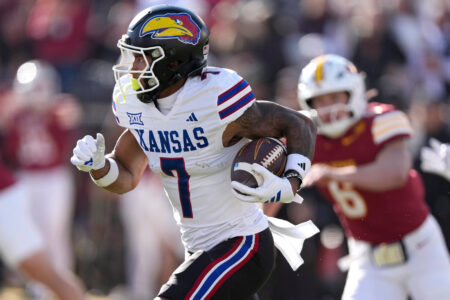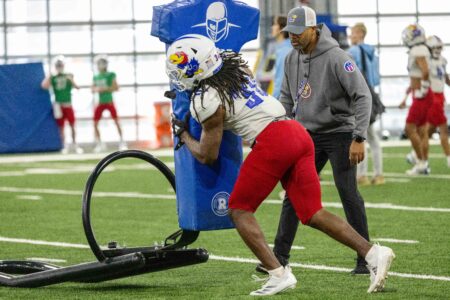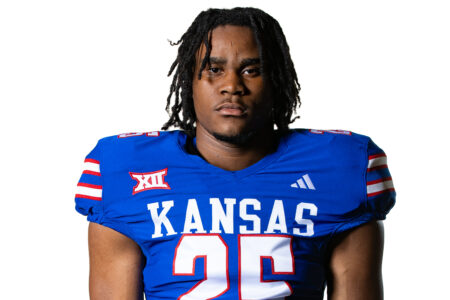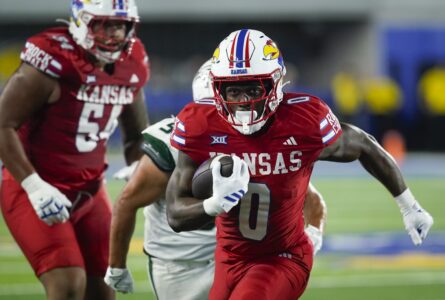Leipold discusses future of spring football as KU approaches new Fan Appreciation Day

photo by: AP Photo/Charlie Riedel
Kansas head coach Lance Leipold talks to his players during the first half of an NCAA college football game against Iowa State Saturday, Nov. 9, 2024, in Kansas City, Mo.
By announcing on March 20 that it would not host its usual Spring Showcase this year, the Kansas football team became part of a broader national conversation about the ongoing evolution of spring football practices.
And while head coach Lance Leipold reiterated on Saturday KU’s initial rationale for making the change — logistical conflicts at Rock Chalk Park, which he said he should have been more aware of amid the ongoing construction at David Booth Kansas Memorial Stadium — he acknowledged that he’s not sure what the future looks like for spring practices more broadly. Currently, the Jayhawks are nine sessions into a 15-practice model cut approximately in half by KU’s spring break.
“There’s a lot of different thoughts out there,” he said, “from how many of these do we do — not everyone’s even doing 15 — (are) there more opportunities to do OTA and minicamp-type things at other times and utilize some of those, or playing outside competition, I think it’s all on the table for discussion.”
OTAs (organized team activities) and minicamps are various multi-day offseason training programs that NFL teams host in the late spring.
As Leipold noted, a full spring scrimmage has never been part of his offseason agenda at KU. That sort of competition, though, is becoming increasingly rare among power-conference football programs more generally, with many canceling their spring games this offseason for reasons ranging from construction to portal-era tampering fears to simply needing to give their players a break.
The NFL provided the inspiration for another new development in the world of spring football, one moving almost in the opposite direction. Colorado coach Deion Sanders recently attempted to take the unusual step of setting up a spring scrimmage with another program — in this case, it would have been Syracuse — but the NCAA did not approve of the prospective competition.
“As we continue to change in college football,” Leipold said, “I don’t think anything’s ever off the table.”
He noted that he had intersquad scrimmages during fall camp when he coached at the Division III level, and suggested there could be potential pros and cons to staging such events in the spring.
“It could be beneficial,” he said. “Any time you go against somebody else is always good. But I’ve also heard there’s things that — are you going to be able to keep a good balance of practicing and evaluating your roster, or are we being evaluated by the outside and our bosses how we play in spring games as well? I know that’s a concern of some people.”
In the interim, KU has replaced its typical spring event with a so-called Fan Appreciation Day, set for Saturday, which will feature about two hours of open practice, as well as an autograph session and a family fun zone.
“Trying to find the best (way) to try to still not deny our fan base an opportunity to see this football team, I think we’ve come up with a good solution,” Leipold said, “and hopefully something that’ll be a benefit next week.”


